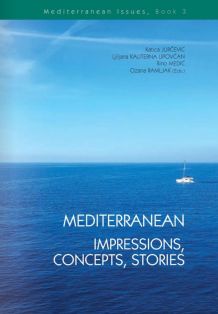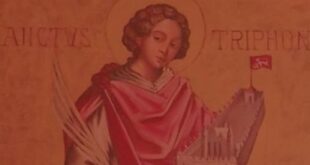Kao 3. knjiga niza Mediterranean Issues objavljen je zbornik odabranih radova s 3. međunarodnog multidisciplinarnog znanstvenog skup MIC – Vis 2020 održanog od 16. do 19. rujna 2020. na otoku Visu u Hrvatskoj. – MIC – Vis 2020
Katica Jurčević, Ljiljana Kaliterna Lipovčan, Rino Medić, Ozana Ramljak (Eds.)
MEDITERRANEAN – IMPRESSIONS, CONCEPTS, STORIES
Mediterranean Issues, Book 3
Institute of Social Sciences Ivo Pilar, VERN’ Group and Croatian Academy of Sciences and Arts, Scientific Council of Anthropological Research (HAZU)
Zagreb, 2021. – 686 pp.
ISBN 978-953-7964-96-2 (Institute of Social Sciences Ivo Pilar)
ISBN 978-953-8101-06-9 (VERN’ Group)
Contents
– Cover | Impressum | Contents
KEYNOTE SPEECH
Charles Farrugia: Mediterranean Voices: exploration and enternalisation
– MEDITERRANEAN ISSUES –
ARTS AND LITERATURE; MEDIA AND COMMUNICATION
Branko Kostelnik: Rijeka – The Punk and New Wave Center of the Mediterranean
Nikola Novaković: Representations of the Adriatic in Croatian caricatures, comic books, and graphic novels
Ozana Ramljak, Neven Hitrec: The Mediterranean as a Constituent Element in Building Literary and Film Space in Slobodan Novak and Ante Babaja’s Opus
Dean Slavić: The Dark Heart of the Odyssey: An Interpretation of the Odyssey 20,345-362
Slaven Zečević: Blending of Political Propaganda and Tourism in “Plave Tišine“ (Blue Silences), A Short Croatian Documentary from the Socialist Fifties
Vanesa Varga: Discourse Analysis of YouTube Vlogs Related to Croatian Islands
CULTURE AND TRADITION; EDUCATION
Erik Brezovec, Josip Ježovita, Ivan Perkov: Social Cohesion in The Croatian Adriatic: A Comparative Analysis of the Dimensions of Social Cohesion in Istria and Dalmatia
Marija Geiger Zeman, Zdenko Zeman, Sanja Špoljar Vržina: All These Wonderful Dishes: Gender, Old Age, and Meanings of Food
Lynette Šikić-Mićanović, Paola Greiner: Trajectories to the Coast and Islands: The Meanings of These Journeys Among People Experiencing Homelessness
Sanja Špoljar Vržina, Marija Geiger Zeman, Zdenko Zeman: Forgotten Wisdoms of the Croatian Mediterranean Past: Heritage Delights and Dangers in the Context of 2020 Covid-19 – Intertwining Some Multidiciplinary Debates
Zdenko Zeman, Marija Geiger Zeman, Sanja Špoljar Vržina: Culture and Nutrition: Multiple Connections Between the Mediterranean Diet and Ageing
Mirela Müller, Goran Livazović: Čiovo Island Residents’ Self-Assessment of Dialect Stigmatization and the Influence of Informal Learning on the Preservation of Cultural Identity
HISTORY; GEOGRAPHY, MIGRATION
Zlatko Đukić, Majda Rubić: The Impact of the Village on the Island Population and the Hvar Statute from the 14 Century
Damir Magaš: Karst Fields (Polja) of Lastovo Island, Croatia, on Topographic Maps (1:25,000)
Kata Magaš: The Zadar Islands between Extinction and the Renewal of their Population and Schools
Maria Florencia Luchetti, Mariana Avril Sesnich Diomeda: From the Mediterranean to “La Plata” River. A State of Question about Migratory Processes Between Croatia and Argentina
SUSTAINABLE DEVELOPMENT; RENEWABLE ENERGY SOURCES; AGRICULTURE AND FISHERIES
Toni Babarović, Ljiljana Kaliterna Lipovčan, Andreja Brajša Žganec: Subjective well-being during the lifespan in the Mediterranean: U-shaped, declining or no change?
Jasmina Ovčar, Dora Ovčar: Observance of architectural heritage in urban-architectural and legal-economic sustainable development of tourist cities
Josipa Poduje, Dina Vojković: Bearded Fireworm
Goran Sabol, Jasmina Ovčar: Islands – protected oases as a result of quality waste management
Dino Vukušić, Rašeljka Krnić, Vanja Dergić: Sociological aspects of life on the island – an example of activism through the community platform “Pokret otoka“
Mladen Antolić, Dudley Stewart, Diana Baus: The Use of Solar Energy for Production of Electrical Energy and Sustainable Development of Croatian Islands
Kristina Mastanjević, Vinko Krstanović, Ana Barišić, Krešimir Mastanjević: Craft-Beer Sensory Acceptance at Mediterranean Summer Temperatures
TOURISM; PUBLIC SERVICES
Kristina Henriksson, Irma Mänty, Päivi Mantere: Developing Services with SMEs on European Islands
Julia Ježina, Ines Sosa Meštrović: Destination Image Comparison of Five Croatian Islands
Maja Kolega, Irena Miljković Krečar: Destination Image Comparison of five Croatian Islands
Marko Mustapić, Dino Vukušić, Vanja Dergić: Adventure sport tourism on Croatia’s islands
Maja Račić: Rural Tourism in the Function of Sustainable Development in Croatia
Majda Rubić: Interest in the Islands of the European Committee of the Regions
– OTHER ISSUES –
Nikolina Borčić: Conceptual-Narrative Frames as a Lingusitic Tool in Political Communication
Luka Boždar, Marija Slijepčević: Fact-Checking in The Region: Comparative Content Analysis of Fact-Checking Portals from Croatia, Serbia and Bosnia and Herzegovina
Anita Bušljeta Tonković, Ivan Brlić, Nikola Šimunić: Overtorurism at a Natural Heritage Destination: The Plitvice Lakes National Park Case Study (Croatia)
Claude Cellich: Negotiating in a VUCA Environment
Mirela Holy: The Role of Media in Environmental Communication: Representation of the Lex LNG in Croatian Daily Newspapers
Josip Kereta, Dinko Primorac, Goran Kozina: Early Warning System in Croatian Enterprises Operating in International Markets
Martina Klanjčić, Nikola Novaković, Sanda Marjanović: Foreign Languages and Higher Education Curricula of Health Study Programmes in Croatia – Student Needs and the Current Status of Language Courses
Dubravko Kraus, Krunoslav Babogredec, Nataša Jeličić: Security as a Factor Influence at Tourist Demand on the Example of the City of Zagreb
Joško Lozić, Ozana Ramljak, Ines Lozić: Transformation of the old media industries under the pressure of a postmodern society
Sanda Marjanović, Nikolina Borčić, Mara Pekez: Croatia and Croatian Identity in German Language Tourism Textbooks
Melis Mladineo Brničević: Relationships Between Motor Abilities and Kinematic Characteristics and Results in 60m Hurdle Running
Julianna Nemeth, Norbert Sipos: Managerial Income Polarization Along the Hungarian Nuts4 System
Marina Perić Kaselj, Katica Jurčević, Borna Jurčević: Religious Practices of Renown Croatian Athletes in the Diasporra
Mirna Pocrnić, Silvana Fratrić Kunac, Maja Kolega: Students’ Tendencies Towards Using Heuristics in the Decision Making
Barbara Prinčič: From Incineration to New Design Solutions Based on a Circular Economy
Geovanny Genaro Reivan-Ortiz, Gisela Pineda-Garcia, León Parias Bello Darío: Ecuadorian adaptation and validation of the Scale of Risk Factors Associated with Eating Disorders (EFRATA)
Natasha Kathleen Ružić, Katica Jurčević, Marie Kavanagh, Mateja Župančić: E-Tandem Critical Thinking Project: Using E-Tandem Activities to Develop Critical Thinking Skills in Communities of Dispersed Learners of English as a First
Martin Schubert, Zuzana Neupauer: About the (in)ability of senior employees to learn
Hrvoje Sivrić, Ivona Blažević, Helena Dautović: Marketing Mix in the Example of Healthy Food Consumers
Timea Venczel-Szakó, Gabriella Kuráth: Satisfaction of University Professors with Internal Communication Based on the Example of the University of Pécs
Timea Venczel-Szakó, Gábor Balogh: Challenges of Internal Organizational Communication in Atypical Employment – Exemplified on a Survey in Hungary
Anita Vujić Žmegač, Goran Vojković: The ‘’Right to be Forgotten’’ in European Law
Mirjana Trstenjak, Filip Živaljić: Collaboration between civil society and local government – a business model for the revitalization of unused public spaces
Tihomir Živić: The Digitized Parčićiana: A Long-Standing Croatian Lexical Tradition
About the Authors
Organizers
Partners
Reviewers
The conference book offered to our attention is devoted to the socio-economic, historical, cultural and anthropological dimensions of the diverse local social communities of the islands mostly in the Croatian Adriatic, but it bears the spirit of the whole Mediterranean cultural area. The research presented at the 3rd International Multidisciplinary Scientific Conference MIC – Vis, 2020 is impressive both for its multiplicity and for the diversity of the topics and the questions and issues raised. The conference organizers can only be congratulated for this successful meeting of scientists, people and cultures from different parts of world and the Mediterranean in particular. I hope other organizations and academic institutions in other Mediterranean countries will collaborate, share in the research and test methodologies developed in these works on their territories and region, and of course, organizing new encounters of explorers and locals on Vis, despite the current limitations of the COVID-19 Pandemic.
Petko HRISTOV, PhD, Institute of Ethnology and Folklore Studies with the Ethnographic Museum, Bulgarian Academy of Sciences in Sofia, Bulgaria
The contributors, researchers from different academic circles, explored at a high level, a lot of issues and connections that define in this case, the Adriatic Sea and its islands, in the macro Mediterranean region, as a complex one that has great heterogeneity in various aspects, such as historical, geographical, anthropological, sociological, and economic. They highlighted this culturally diverse region, symbol of tradition and modernity, as capable of shaping, congregating and synergizing national identity and culture. I welcome this excellent book, congratulating the participants and organizers of this outstanding conference held in the island of Vis, for their contribution to scientific knowledge and cooperation, strengthening also the academic institutions that support them.
Juan Carlos RADOVICH, PhD, Universidad de Buenos Aires, Anthropology Department, Argentina

 Institut društvenih znanosti Ivo Pilar Pilar
Institut društvenih znanosti Ivo Pilar Pilar




